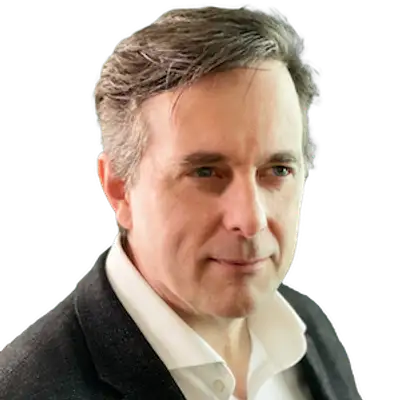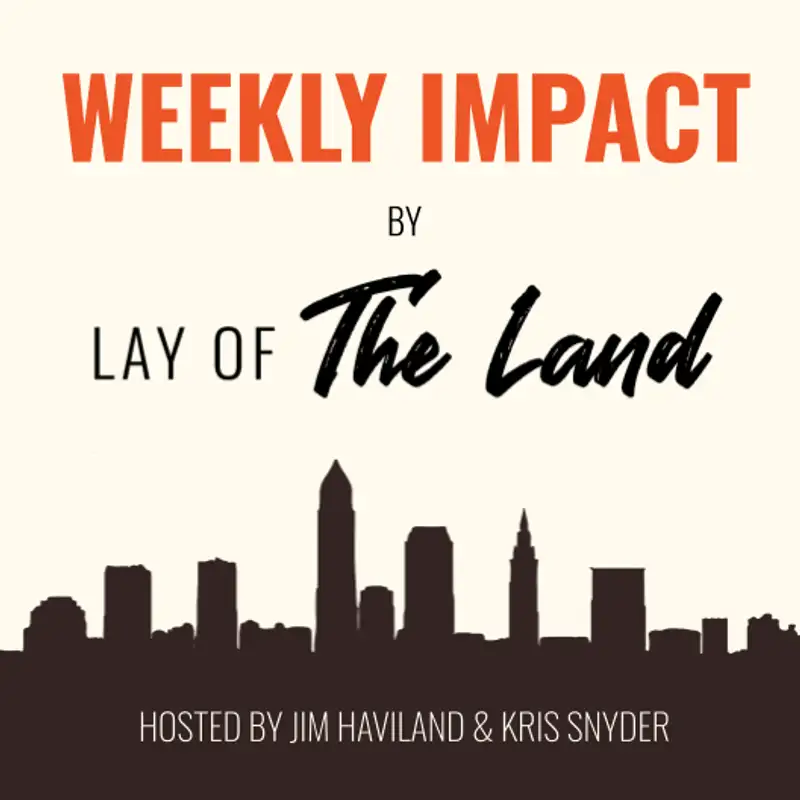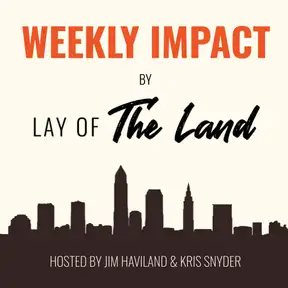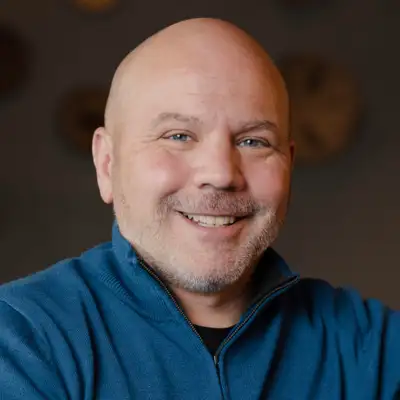7-29-2024 Bob Malley, Cleveland Innovation Summit
Jim Haviland & Kris Snyder (00:00)
Hello everyone, this is Lay of the Land weekly impact for the 29th of July, 2024. My name is Jim Haviland.
I'm Kris Snyder. Hey Kris, how you doing? Jim, I'm excited to talk about everything we got on deck today. through the summer quick here. But today we're talking about a famous name here in Cleveland. We're talking about Bob Malley of Malley's Chocolates. That's right. Episode 176. 176. We are getting up there. listen, this is a great family business and this was a really great story about how to create succession planning in a family
And my god, I just really appreciated so much about this, Bob's ability to tell the story, Bob's ability to be very conscious of the limitations and be aware of how he's a third generation and how unlikely it is to be successful. Yeah. So he is a really good storyteller. I had visualizations of the things as he was describing the sandwich shop and his grandfather. And like, just see it and almost taste it even. Right. So it was it was a really good story.
And part of that in telling us such a good story was the respect for the work that went before him, right? And the generations being a third generation, but the generations of work that had to be there, the risks they had to take, the things they had to get through and do. There was just such a, and you could tell that I think part of that success in a family business like that is that respect and knowing that it wasn't easy. Yeah, the full awareness of a whole arc of the story, 100%.
I mean and it was really interesting that he was aware even that he wasn't aware didn't appreciate as a child Yeah, we just thought it was normal, but no we're actually building an institution. We all have chocolate So I think the gosh great story about listening to customers the The fact that it's a chocolate shop not a deli. Right? That's a great pivotal moment pivotal moment, but also
And that became really one of the things I loved. I'm sure you love this too, the Malley moments. Well, obviously we love to say important things have names, right? And to recognize that their customers were telling them about an important moment for them. And they turn that into a thing to be recognized and give it kind of its life and its identity. We talk about impact moments, but it really that is what it is. This is how Malley's impacted me. It wasn't because I had chocolates, because it's the emotional impact of the product.
or the fact that you were there or the fact that it brought back memories. Yeah, and it often, because we use impact moments in kind of the client session work we do, it's when a concept lands, clarity emerges, and then you know what you should do. There's a little bit different because the Malley's moment was often something of enjoyment, right? Like, hey, my family did this thing traditionally and we always had Malley's chocolates involved or whatever the case might be. Yeah, well, and I think it's, but it talks about what's important about that business and that, just like
but when we do it with our sessions, it's like this is a moment we have to recognize. We're gonna give it a name and we should recognize it because it matters for how we think in the future. his self -awareness and how he represents the self -witness of the family, even to the point where they have a board selected specifically to keep them on the straight and narrow, which is we don't always pick our boards that way, Kris.
Well, no, I think often you see boards and it's around ownership, right? It's not about the respecting of the outcomes of what that's getting built. It's like, I own some stock. I'm going to be on your board and I'm going to tell you stuff, tell you some stuff. And I may be connected to the greater good of you and your generations to come. But most of time I'm not there may not have ever been an operator. Right. And I just really want to maximize my investment, really. Right. Right. And I think that's they weren't I don't think their board was about that. I think that was really kind of building the business, thinking about the things
that a family business should be aware of family in the business and generational outcomes. And you could tell he really goes into the work of challenging these things, challenging the notions that, because we know this well, multi -generational businesses, the failures are, the person who didn't get to the third generation, I mean, I he mentioned it, I know I've heard it from my client, Mary Conlon, it was on show number 156. She's the second generation, but kind of third because the wife took over her
took over first, but she knows she wants to pass off a great business to her third generation. It's why they're doing the work they're doing now with the business operating system. And I know we've had Riley Burke on the show too with Burke Enterprises, second generation, but she's being very clear that she has to pick up the mantle of it and that she has to find her own vision for it, but still be completely honoring what has come before to be able to do that well.
I can think of on the top of my head of generational transition businesses where the parent -child relationship that the parent was trying to make the motion to the owner's box and kind of speak and then you've got the the child coming in and and trying to figure out what their their component their contribution to legacy and This is what I was important Malley's in my experience as well as if that child had gone and worked somewhere else Yes, their ability to impact the business there their perspective was shaped by work working someplace else
I'm not saying that's the only path. I'm saying what I've seen in coaching, what Bob was relaying, was like Bob that had been away for a long time, right? It wasn't just a hot minute. Well, because I might go a little step further and say, I haven't seen it work well unless you've gone off and do something else for a while. You've got to go find your path. You've to be the prodigal son and come back. then because that perspective is important, you you've got to be able to put more hands on the elephant, as we say. And I really liked also how he talked about his siblings because he's got more than a few. Yeah.
and what their path was related and around the business and you know were they ready to retire and they were looking for something to be associated to or with right and yes there's some economics that need to come along this but it sounds like they've just done a really solid job of being intentional about what they've been doing with that. Yeah it was great so a great show folks don't don't miss out on this one especially if you have some rally moments in your past you'll appreciate the stories that go along with it and so Kris I also want to talk about the Cleveland Innovation Summit
that happened this last week.
Really a firecracker of I mean, I think he's young. I don't know if he's young Kris He's young to me, but he's got all the going on again Justice Mendez of 161 ventures. They are there a VC private equity special purchase vehicle kind of thing So they're making things happen for for startups, but he put together this really great event and I know Todd Fetterman from North Coast Ventures who's been what show was he 28?
a client of ours and a good friend, he was blown away by like, people stayed a long time here. There was the panels, but then people just stuck around. No one left after the first panel or the second panel, because the three panels were so interesting. It covered the economic development part of entrepreneurship in town, which has its own universe. then the startup part of town, that's where our very own Jeffrey Stern, we led a panel of people that had been on
here on the show Cal from Pandetta was on or summer 60 Dallas Hoggins in from Felix 86. then my favorite was Drew Anderson market Mac Anderson from Cleveland Kitchen. He was formerly Cleveland crowd Was there and and drew was charming as all get out. He's like, you know They love making crowd. They loved having the name Cleveland crowd Cleveland, you Cleveland kitchens on labels all over the all over the country. Yeah But but it was really
created that environment where, and then the last group was all where the money's coming from. it was, Todd was Ray Leach, who's now part of the Ohio Fund.
I was from show 69, but there was a bunch of like talking about where the money's coming from and how money's being deployed. And they were all interested, everyone was interested in hearing all of each other's stuff. I, Kris, I had three great conversations with people earnestly doing startups that they were, that they needed all that stuff. They needed to have a sense of what's the economic development resource I have available to me. You who are some people that I can get into commune with, you know, credit community with other entrepreneurs and where the heck is the real money gonna come from?
and they were pitching like crazy, Kris. mean, seriously, I got to go into coaching mode half a dozen times, like asking them questions, but it was great to see all the enthusiasm. And yeah, it really, to be quite frank, Kris, we don't, in some of the communities we support, we don't see that many people of color.
basis and there were plenty there because it just created this new center of gravity. it was great job to Justice Mendez on pulling it all together for sure.
So next time Kris, got to make sure you get to see Is this going to become a series or is this more like just an exploration one time event? Well, Justice Medas is going do lots of stuff. So we're going keep our eye on him. We'll find out. I saw him. TBD. I'm following him on social now. He was out in Seattle doing something. he's, you know, he's hitting the ground running. Last one, Kris, let's talk about some impact moments. So we talk about Mali moments. Let's talk about impact moments. know we every week, Kris, because I'm looking for it, maybe this is true for you.
So what I'm doing with our missus you're not in session. I seem to come up with some stuff It's like my god, I gotta write that down. Yeah. Yeah Well, I think the session just makes that much more clear because I think we coach to it, right? We we tell people that it may or may not happen So don't make it as part of your expectation of success for the day, right? But when it does we're gonna we're gonna pause we're gonna acknowledge it and if there's something to be action to be taken We're gonna acknowledge that as well. And maybe that becomes a to -do or something else but you know for me last week, it was coaching a great long -term client and
we were, one of the favorite things people talk about in business development is referrals. It's often on a scorecard for production, like how we doing? And we weren't really getting to that referral number we want. And so we started to kind of like unpack it, dig into it. And I think the, what the aha or the impact moment really became was we have to have strategic alignment with the groups that we're going to be asking for referral. And so often what happens is we spray and pray into the referral. Like anybody who's got a pause, could you connect me to someone?
like if I can build a rhythm, this is a law firm that where it came up our best source of referrals really is someone in financial planning. Both have long term perspectives of that client, right? Both have overlapping value gets created in the exchange of that. And so it really became this moment of like, gosh, it seems like such an obvious work to go to. But when we think about referrals, if you're a professional service business, if you're serving SMBs especially,
Don't just be afraid to ask for it, but know what you're asking of and who you should be asking it for. Yeah, that's a great, I like that nuance on some other principles like you and I both know all too well. mean, this is one of your stakeholder groups, your people that would refer to you. But certainly we've seen this when we're doing Vox with the carriers. If we didn't have enough economic center for the carrier reps to represent what we're doing, they just weren't gonna do it. You gotta dig into the economics for it to make sense. But it's even beyond that. It's beyond that.
economics of human value, of connection. I think that's so great because it's actually right. I if you all have the same incentive for why you're building relationships, then that would be better than money. And I just want to plug Dan Sullivan, real quick, strategic coach. He's got this concept called FreeZone, and it's become much more popular in those folks there, participating in his work at Strategic Coach as well as kind of the EOS community. And FreeZone is where we do collabs together.
But we don't actually expect like a financial thing for you to pay me something. Right. It's like, let's find our alignment together and do this collaboration. And we're both going to benefit from it. But it's not me paying you, you paying me. And it's it's hard. Right. Because we're so used to, if I give you a lead, you're going to do this. And the reason we get sideways is because I feel like I'm giving and you're taking right or something. And anyway, so I think the free zone concept is cool. I love it. We'll see how it takes off. you know, and I think like I told one of
partners yesterday, if you create an environment where I can have 10 meaningful conversations with people that are target market, I don't worry about whether any of them move forward because one of them will eventually or someone that they know will. I need that opportunity where I can actually be coaching people for free. Eventually people go, you know what? That sounds like someone, I need to talk to you. We need to make this real. And I just know that for sure so I'll give it away all day long because I just know what happens.
For me, Kris, the one that came up last week, and this is about the subtlety and importance of language, is that we had a team who just out
with no malice intent whatsoever, we're talking about both customers and also employees in ways that were somewhat derogatory. They just weren't being careful. But the one I'll mention is lower level employees. This isn't about lower level employees. And the thing we know about brain science is that the more you say that, the more it actually changes your perception of whatever you're talking about. So you should never say lower level employees unless you want to hate them.
Your intent is to despise them or to think low of them because some of those employees that aren't at the table yet are going to be at the table someday or that's what you should be hoping for. You should be a leader building leaders building leaders and for do that it's like you it has to be a matter of yet not that they could never do the work like otherwise you've made a mistake you shouldn't have had them in the first place right but and that but I pointed out it was like an aha moment for them like well of course we shouldn't say that of course because you know some of the people in the room
were those people not that long ago and just like, no, but I got here because someone believed in me and they gave me the opportunity. don't speak ill of your stakeholders because on any of the sides because it'll change the way you perceive them and it won't give you the opportunity to have that free zone. Yeah, words matter. I think even more importantly, and bravo to them, is that they had the ability to recognize what they did.
and just change the behavior, modify the behavior, learn from it, and move. because even with all the best intent, we make these mistakes, and we just have to keep going better and better. All right, Kris, did I miss anything? I don't think you did. And until next time, Until next time, folks. Have a very impactful week. Take care, Kris. Bye. Bye. Bye.
Creators and Guests



